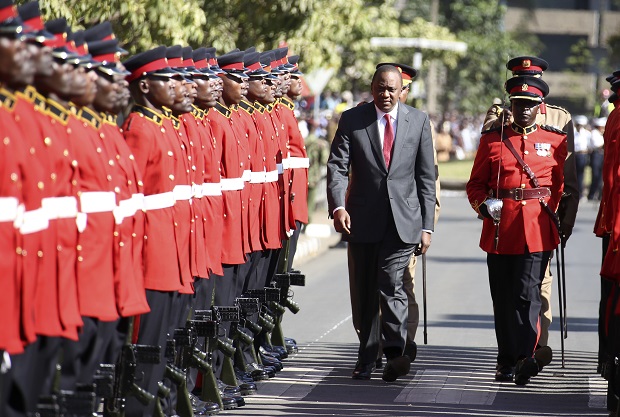Kenya’s Kenyatta becomes first president to appear before ICC

In this photo released by Kenya’s Presidency, Kenya’s President Uhuru Kenyatta inspects an honour guard of the Kenya Defence Forces (KDF) upon his arrival at the parliament in Nairobi, Kenya Monday, Oct. 6, 2014. AP
THE HAGUE — Kenya’s Uhuru Kenyatta on Wednesday became the first sitting president to appear before the International Criminal Court where he has been charged with crimes against humanity.
Kenyatta, who handed power to his deputy before flying to The Hague, was summoned to answer questions about his floundering trial for allegedly masterminding deadly post-election violence in 2007-2008.
Wearing a charcoal suit and blue tie, a relaxed-looking Kenyatta spoke with his lawyer before the start of the “status conference.”
ICC chief prosecutor Fatou Bensouda, who has alleged witness intimidation and that Nairobi is withholding evidence, was also present.
“The case is at a critical juncture, which is why I deemed appropriate to be here in person,” she said.
Article continues after this advertisementMany Kenyatta supporters and Kenyan MPs were in the packed public gallery, with some frustrated at not being allowed access.
Article continues after this advertisementRepeatedly-delayed case
The repeatedly-delayed case has seen at least seven prosecution witnesses drop out, allegedly through bribes and intimidation.
Judges could decide to send the case to trial or to abandon it after the prosecution said it did not have enough evidence, although a decision is not expected on Wednesday.
A handful of demonstrators sang and danced outside the ICC ahead of Kenyatta’s arrival, many of them dressed in Kenyan colors.
One large banner read: “Hands off our prez, he is innocent.”
“We had to come today because of course he is innocent, he never participated in any killings,” said Paul Kobia from Nairobi, 46.
Kenyatta, 52, faces five counts at the ICC over his alleged role in orchestrating unrest in 2007 and 2008 that left 1,200 people dead and 600,000 displaced.
The Kenyan leader has appeared at the ICC before, but not since he was elected president in March 2013.
Kenyatta arrived in The Hague on Tuesday, having temporarily handed power to his deputy and erstwhile political opponent William Ruto.
Ruto is already on trial at the ICC for his part in the violence, while Kenyatta’s trial has yet to begin despite a drawn-out three-and-a-half year legal saga.
Not enough evidence
The Kenyan leader’s trial was originally scheduled to start Tuesday, but that was put off after prosecutors admitted they did not have enough evidence to proceed.
Bensouda last month asked for an indefinite postponement, saying Nairobi had refused to cooperate with a request for financial and other statements.
The prosecution hopes the documents will shed light on Kenyatta’s alleged involvement in the violence that brought one of east Africa’s most stable countries to the brink of civil war.
Prosecutors on Tuesday asked the ICC’s judges to rule against Nairobi for not cooperating in their probe, saying their case had reached a “deadlock.”
They want Kenyatta’s bank statements, tax records and telephone records relating to the period of unrest. They believe that the documents could prove Kenyatta’s part in bankrolling and orchestrating the violence.
‘Terminate proceedings’
Bitter memories are still fresh from 2007, when elections escalated into ethnic conflict, for which Kenyatta and Ruto were charged with crimes against humanity. Both reject the charges.
The African Union had previously called for the ICC cases to be withdrawn and transferred to Kenyan courts, accusing the ICC of targeting Africans.
Kenya’s post-electoral unrest shattered the east African country’s image as a beacon of regional stability, as opposition chief Raila Odinga accused then president Mwai Kibaki of rigging his way back to power.
What began as political riots quickly turned into ethnic killings of Kenyatta’s Kikuyu tribe, who in return launched reprisal attacks, plunging Kenya into its worst wave of unrest since independence in 1963.
RELATED STORIES
International court weighs Kenya president’s case